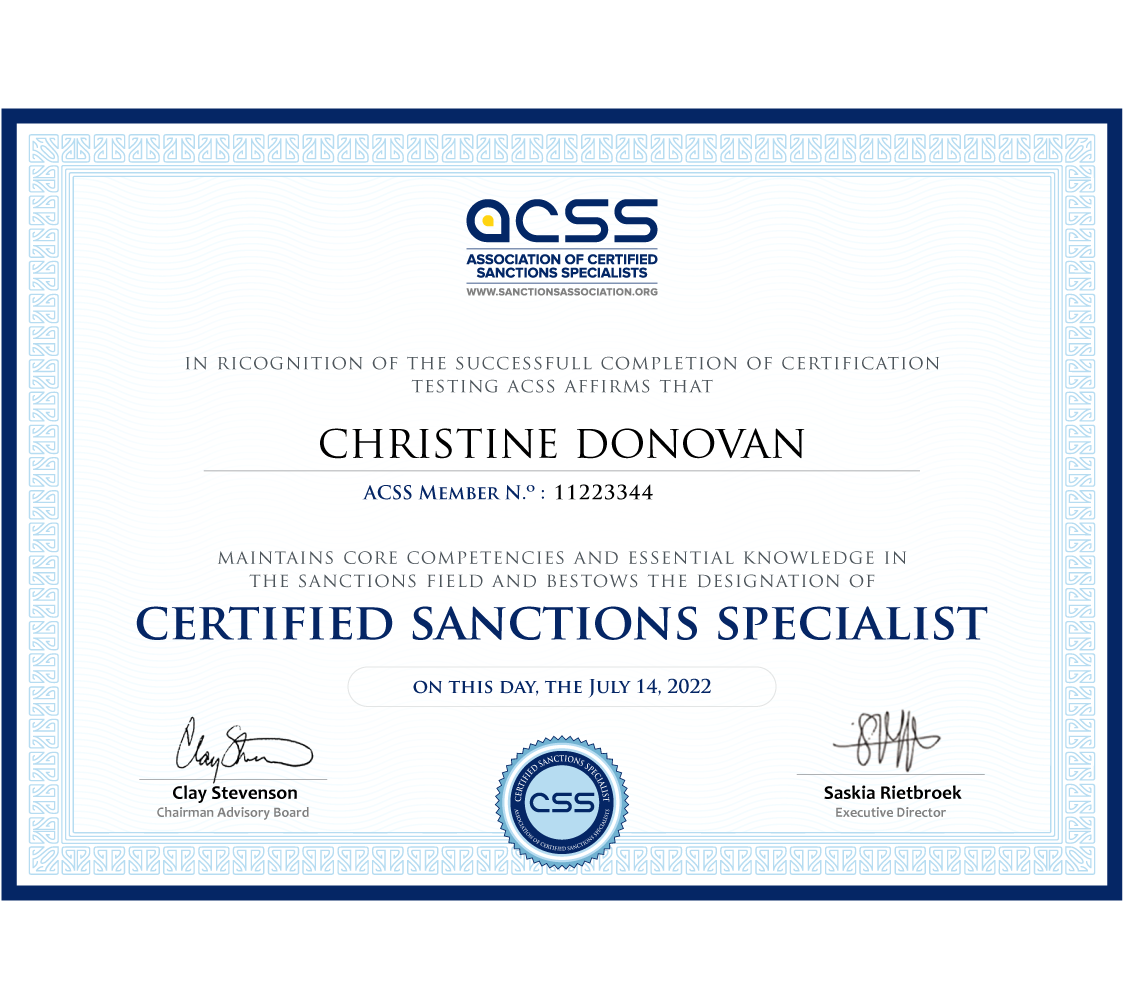Invest in your Career with the
Certified Sanctions Specialist
Certification Program
The CSS Program Certifies you as a Sanctions Specialist
If you have anything to do with export controls or sanctions compliance, you are a prime candidate to benefit from Certified Sanctions Specialist (CSS) certification. CSS holders come from diverse backgrounds united by their professional interest. .
CSS is a big step forward for beginning or developing a sanctions career. It’s a flexible program that fits in with the busiest of schedules and is a great way to show an excellent understanding of sanctions compliance and trade controls.

Build On Your Knowledge and the Rewards Will Follow
The curriculum elaborates on the full anatomy of sanctions and trade controls, including the UN’s role, and examines US and EU practices. It covers due diligence, screening, how agencies such as OFAC work, sanctions evasion investigations, and much more – all essential topics practitioners must know.
You or your team can gain the CSS 3 months after starting your studies. But you have up to one year to prepare for the proctored exam. It can be taken at a convenient date and time at one of over 5000 centers worldwide. You can also take the exam with a virtual proctor at your home or office.
The CSS qualification is recognized worldwide and is administered by the Association of Certified Sanctions Specialists (ACSS). The ACSS is dedicated to furthering the careers of its members and providing first-class professional training and education.
As a CSS, you gain many benefits, a higher profile and access to a community of like-minded professionals. It is a mark of distinction that confirms your knowledge of the specialist subject of sanctions and trade controls.
Testimonials
“Being a part of the ACSS membership has provided essential access to sanctions compliance trainings and latest information. As a sanctions professional, the Certified Sanctions Specialist Certification was imperative to improving my expertise in the field. My favorite part of the Certification was how it consistently demonstrated examples and exercises with real-world applications and made sure I came out of the course prepared to deploy the knowledge in real time.”
“The overall experience was very good. I enjoyed all the parts of the certification journey. The whole ACSS team was very helpful and understanding. Always a pleasure interacting with the ACSS family.”
Who Takes our Certified Sanctions Specialists Program ?
60+ Countries
What Industries Do They Work In
Job Titles of our Candidates
Candidates in Sixty-Five Countries
Who can Apply for CSS Certification?
Eligibility requires a minimum of 40 points based on education, experience and other factors. But if you fall short of 40, you can take continuing education programs with ACSS or other sources. Virtual Classroom lessons count for 21 points. See Eligibility and Applications – Points-Based Entry Requirement. You must provide 3 professional references. To use and display the CSS credential, you must have an active ACSS membership..
Course Description
Having the “CSS” credential after your name requires a thorough grounding in sanctions as administered by US and EU authorities. Rest assured that our expert practitioners and educators have your best interests at heart. Our mission is to help you gain the necessary knowledge to pass the exam.
With your new knowledge, you can contend with the sanctions and trade controls issues you will likely face.
CSS Exam Preparation Guide: If all you need for learning is the study material, choose the CSS Exam Preparation Guide. After purchasing this option, you can download the guide, which is an online PDF. You will need self-discipline to comprehend the material in time for your examination. The guide ends with practice questions to test your knowledge in preparation for the exam.
Virtual Classroom: If you prefer a classroom structure for learning, choose the CSS Virtual Classroom. You will watch live web-based lessons and be assigned homework. Virtual Classroom divides the CSS Examination Preparation Guide into six two-hour interactive classes held weekly with an expert instructor. Apart from providing in-depth analysis, the instructor can answer any questions.
All sessions are recorded: You can watch them later If you cannot make a live viewing. Or you may choose to watch them again. You can also download specially prepared presentation slides with informative diagrams and vital summaries. If you choose this option, you will be enrolled in the next Virtual Classroom.
What you will Learn
What You Must Know to Pass the Exam
The CSS curriculum provides you with the knowledge sanctions officers need to comply with sanctions and trade controls rules and regulations. In creating the program, we analyzed job requirements, US and international best practices, and international sanctions and trade control frameworks.
We provide the certification on three different packages.
OPTION 1
CSS Certification Standard Package
Package includes:
1. The CSS Exam (physical or virtual)
2. The CSS Exam Preparation Guide
Disclaimer:
The practice questions in the CSS Exam Preparation Guide are not meant to indicate the exact style or difficulty of the actual CSS Exam questions. They are provided only to help candidates review the content of the course material.
OPTION 2
CSS Certification Self-Paced Package
Package includes:
1. Everything in the CSS Certification Standard Package
2. 40+ Videos
Our specially prepared videos cover all the topics you need to know, starting with an introduction to the CSS Exam. The program continues with an additional videos featuring lively, instructive, concise videos covering the breadth of sanctions in six sections. When you have finished, you will know all about the types of sanctions, the imposers, the targets, have a foundation for a successful sanctions program, be able to discuss the 50% Rule, know how to contend with evaders, be familiar with screening, OFAC investigations, and much more.
OPTION 3
CSS Certification plus Virtual Classroom Package
Package includes:
1. Everything in the CSS Certification Self-Paced Package
2. Six 2-hour virtual classroom training sessions
Receive extra guidane in a structured learning environment. An expert instructor discusses the study materials and assists in six live weekly, two-hour, web-based interactive classes.
Syllabus:
1. Sanctions Regime Types, Goals, Prohibitions and Effects
You will be introduced to the different kinds of sanctions, the common prohibitions and exemptions, and their effects.
2. Sanctions Imposers and Targets: The International Arena
You will learn about the breadth of sanctions from the UN Security Council sanctions architecture, the EU sanctions mandate and different member sanctions regimes to other unilateral imposers such as the UK, Japan, Canada and Australia.
3. Sanctions Imposers and Targets: Spotlight United States
The focus is on US regulations administered by OFAC and other government agencies. The coursework includes Executive Orders, statutes, key programs, targets, types of sanctions and licenses.
4. Essential Components of Sanctions Compliance Programs
Discussed are OFAC’s 5 essential components of an effective sanctions compliance program, customer due diligence, the 50% Rule and compliance considerations for specific industries.
5. Role of Technology, List Screening and Other Operational Processes
This module covers technology, sanctions lists, screening principles and tools, Wolfsberg Guidance, other operational issues, and more.
6. Enforcement, Investigations and Sanctions Evasion
Under examination are OFAC investigations and enforcement, interaction with other agencies, internal investigations, the impact of voluntary self-disclosure and critical points about sanctions evasion in finance and other sectors.
Instructors

Martijn Feldbrugge

Ian Matthews

Scott Nance

Saskia Rietbroek, CSS

Martijn Feldbrugge
Director at BSCN BV

Ian Matthews

Scott Nance
Principal at Langley Compliance Consulting, LLC

Saskia Rietbroek, CSS
Executive Director and Co-Founder of ACSS
Saskia frequently speaks English, Spanish and Dutch on various financial crime topics.
Saskia earned law degrees from Leiden University (Netherlands) and Universidad La Católica (Lima, Peru) and was admitted to the Lima Bar Association. She also holds an international MBA from Florida International University. She speaks fluent Dutch, English, Spanish, and basic German.
FAQs
Who can take the exam?
Eligibility requires a minimum of 40 points based on education, experience and other factors. But if you fall short of 40, you can take continuing education programs with ACSS or other sources. Virtual Classroom lessons count for 21 points. See Eligibility and Applications – Points-Based Entry Requirement. You must provide 3 professional references. To use and display the CSS credential, you must have an active ACSS membership.
What topics will be on the exam?
The exam covers all key topics pertaining to international best practices, the UN, and principal sanctions frameworks.
How is the exam administered?
Exams can be taken throughout the year at one of over 5000 testing centers worldwide or with online proctoring at home or in your office. Please refer to the Candidate Handbook for more details.
I passed the CSS exam, which my company paid for. If I leave the company, will I keep my credential?
Credentials travel with the person. Accreditations and memberships are personal, regardless of whether the institution paid for it. Ensure that you renew your membership to keep your CSS credential active.
How do I recertify after my CSS expires in 3 years?
Sixty continuing education points must be accumulated within three years after obtaining a CSS or recertification. These can be sanctions or export controls-related courses from ACSS, internal training, or other providers. The deadline for earning continuing education points is December 15 of the year of your recertification.
Why should I take the CSS exam?
How do I apply and what are the payment options?
You apply online and pay by credit card for immediate enrollment.
How much time should I allocate to study?
The time you require for studying depends on your existing knowledge of sanctions and trade controls, among other factors. If you choose the self-study course, pace yourself to learn the material at a rate that fits your work and personal schedule. The Virtual Classroom course imposes a structure that some may prefer. If YOU fail on the first attempt, you can resit the CSS exam at no extra charge within one year of enrolling in the program.
Do you provide sample questions to prepare for the exam?
Practice questions followed by answers are at the end of the CSS Exam Preparation Guide and in the lessons of the CSS Virtual Classroom.
Contact
Additional questions? Contact ACSS for more information, Please email acss@sanctionsassociation.org and we will get back to you soon!
